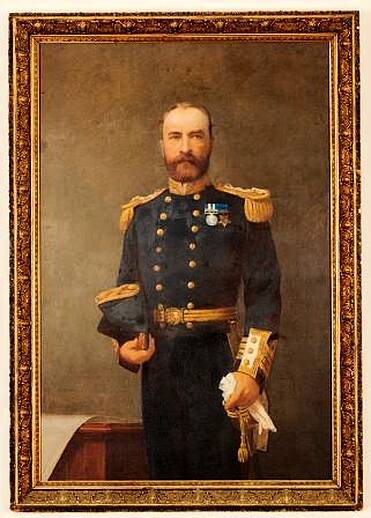Henry Coey Kane, class 1857
In Memoriam

Admiral Sir H. C. Kane, K.C.B.
Admiral Sir Henry Coey Kane, whose most famous exploit was the saving of Her Majesty's ship Calliope in the hurricane at Samoa in 1889, died at his residence in London on the 30th January, 1917, aged 73.
He was the second son of Sir Robert Kane, of Fortlands, Killiney, and Glandree, Co. Clare, President of Queen's College, Cork, and previously the founder and director of the Industrial Museum in Dublin. He came to Castleknock in 1854, and joined the Navy in 1858. In the Chronicle for 1895 will be found a full account of his life, written by himself, from that time until 1862, when he became Lieutenant.
In July, 1882, he became Commander of the Northumberland, and in that position accompanied the Channel Squadron to Egypt, where he directed the landing party at the occupation of Ismailia on the night of August 20, and was in command of the guard of the Suez Canal from Ismailia to Kantara from that date till he was selected as second in command of the Taval Brigade to operate with the land forces. He took part ill the night march of September 13, in the battle of Tel-el-Kehir, and in the advance of the troops to Zagazig. For his services in Egypt he was promoted Captain, mentioned in despatches, and awarded the Egyptian Medal and the Khedive Bronze Star. He was appointed, on account of his knowledge of languages, to be Naval Attache at the Foreign Office, and occupied that post four years, when in January, 1887, he was put in command of the Calliope.
On March 16, 1889, the Calliope was sailing in the Bay of Apia, the principal European port of the Samoan Islands, accompanied by certain vessels of the American and German naval squadron. Suddenly a terrific hurricane burst over the islands from the league-long waters of the Southern Pacific. Two German gunboats were wrecked and their crews lost, and three American vessels were also wrecked. No fewer than 130 lives were lost. Captain Kane determined to attempt an escape from the reef-bound and perilous bay in which the Calliope had been sheltering, He ordered full steam ahead, and, inch by inch, fought his way out in the teeth of the hurricane until he reached open water, where comparative safety was obtained, and thus by his indomitable pluck and seamanship saved his ship from wreck and his crew from death.
Captain Kane was created a Companion of the Bath on Queen Victoria's birthday in 1891. His last actual command was the Victory, where he was Flag Captain to the Earl of Clanwilliam.
The late Admiral Kane was first cousin to the distinguished Irish Jesuits, Rev. Robert Kane, Milltown Park, Dublin; Rev, Thomas P. Kane, Crescent College, Limerick, and Rev. William V. Kane, Mungret College, Limerick.
The story of the saving of the Calliope, for which Admiral Kane was awarded the Victoria Cross, has frequently been told. In his Footnotes to History, Robert Louis Stevenson has graphically described the incident:
The Germans, having got into trouble with the Samoans, had set America against them by a violation of the American flag. America was not so tolerant of flag violation in those days, and war seemed inevitable. Germany was for the time the abhorred of nations. Germans in America publicly disowned the country of their birth. In Honolulu, German and American young men fell to blows in the street.
The sequel was the arrival in the flask shaped harbour of Apia of one British, three American, and three German Warships.
On this perilous situation broke the hurricane, The German and American ships were all wrecked, and 130 lives were lost. Captain Kane, on the Calliope, had to choose between being rammed by the helpless vessels which the sea was tossing about on either side of him, being dashed upon the reef, or of making for the open sea through the bottle neck of the harbour. He chose the latter.
If the engines should stand, if they should have power to drive the ship against wind and sea, if she should answer the helm, if the wheel, rudder, and gear should hold out, and if they were favoured with a clear blink of weather in which to see and avoid the outer reef. . .. Upon this catalogue of 'ifs' Kane staked his all.
With machinery red-hot, the Calliope did the trick. Not often in naval history was there a moment of more sickening peril. The Americans, watching from their doomed flagship, generously cheered the English seamen; and when the Calliope returned to Apia three days later it was to find herself the sole survivor of thirteen sail.
Thus in what seemed the very article of war, and within the duration of a single day, the sword arm of each of the two angry Powers was broken; their formidable ships reduced to junk; their disciplined hundreds to a horde of castaways, fed with difficulty. Both paused aghast; both had time to recognise that not the whole Samoan Archipelago was worth the loss in men and costly ships already suffered.
The so-called hurricane of March 16 made thus a marking epoch in world history; directly, and at once, it brought about the Congress and Treaty of Berlin; indirectly, and by a process still continuing, it founded the modern navy of the States. Coming years and other historians will declare the influence of that.
